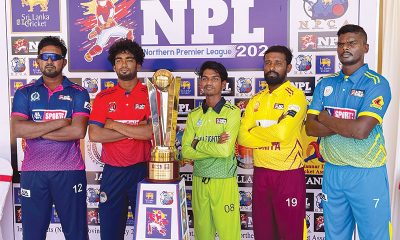News
NPLs seen peaking around 13-pct, some sectors hit up to 30-pct

ECONOMYNEXT –Sri Lanka’s non-performing loans after the latest currency crisis is showing signs of having peaked but some sectors are hit worse than others with problem loans dating back from Coronavirus moratoriums, a banking official said.
Hotels, transport and arts and entertainment sectors had bad loans of 30 to 20 percent, while the overall level was lower. There is a marginal set of borrowers whose loans had been re-structured at high rates and these could turn bad if no action is taken, they said.
“The good news is that our NPLs have now kind of slowed down,” Bingumal Thewarathanthri, who is chairman of Sri Lanka Banks’ Association, told the Sri Lanka Economic Summit 2023. “It was 13.6 percent. Now it is hovering around 13.1, 13.2 percent. The net is down to 7.2 from 7.8 percent. Very clearly we have come to the end of this process.”
Saying Sri Lanka’s NPLs were low around 2.5 percent in 2017, he added: “NPLs came down but suddenly went up in 2018 and 2019 because credit to private sector was double digit when the economy was growing at low single digits,” he said.
Meanwhile, Thewarathanthri said, Sri Lanka’s bad loans hit 15.8 percent in 1999, and that level was not reached in the current crisis. But some sectors are more badly affected than others
“In terms of sectors, tourism NPLs are 33 percent,” he said. “Very clearly some of the tourism sector enterprises will not recover. You can clearly see the stress in that sector. Transport and logistics is 30 percent. Disposable incomes have come down, less consumption, the sector is impacted. Some of our clients who went down during covid will never recover,” sadly.
“Interestingly arts and entertainment is also close to 20 percent. Again, when disposable income goes down there is an impact to arts and entertainment. You first eat.”
After the Easter Sunday blast, hotels were given relief. In 2020 more broad-based relief was given and extended.
“There are no standard moratoriums going forward,” Thewarathanthri said. “Banks are fully aware of who is in stress and there is a lot of restructuring happening as we speak.
There were three types of enterprises, that took moratoriums, he said. “Some took the moratoriums and somehow paid, They disposed some assets, they took cost action, they understood the size of the business what is possible, what is not possible. I would say close to half were actually have gone ahead and done that.
“There is a good 20 percent I would say who had taken the moratorium and done other things.They thought they can buy time and wait and they did not have to settle these loans. They are in stress. These firm with no cash flow are lobbying for more moratoriums.
There was a third sector which took moratoriums who were unable to settle due to due to inadequate cashflows. Some hotels had recovered close to 80 percent of pre-Covid level but were not fully recovered, but were managing to service the debt.
Many loans of the loans were restructured in the recent past at “very high rates”, which the banks had to look at again.
“That component I think all of us in the banking community will have to take a look at that component and see what more can be done,” he said.
“If there is no cashflow there is no payment. Period. We can celebrate the NPLs have come to the bottom but you never know. If that portfolio goes bad, that’s a good portfolio going bad.
“The promoters are good, the business models are good. But sadly the cashflows are not supporting. So that individual banks are actively looking at them and supporting them.”
Several other countries which had currency troubles are also hit.Ghana, a country which defaulted, amid a severe currency crisis, has about 20 percent bad loans.Bad loans in Bangladesh, which is going through ‘external stress’ was 10 percent, Thewarathanthri who is also Chief Executive of Sri Lanka’s Standard Chartered Bank said.
“There is stress in the banking systems post-Covid,” he said. “Central banks have done moratoriums. There is stress in the banking systems coming out of the moratoriums as well. What we have seen is actually larger companies have taken market share … and grown.”
Similar trends were seen in Sri Lanka, he said. “SME turnovers are down by seven to 30 percent in Asia. Some of our SMEs have completely gone down.”
News
US sports envoys to Lanka to champion youth development

The U.S. Embassy in Colombo welcomed the U.S. Sports Envoys to Sri Lanka, former National Basketball Association (NBA) and Women’s National Basketball Association (WNBA) players Stephen Howard and Astou Ndiaye, from June 8 through 14.
The Public Diplomacy section of the U.S. Embassy said that it would launch a weeklong basketball program intended to harness the unifying power of sports, made possible through collaboration with Foundation of Goodness and IImpact Hoop Lab.
While in Sri Lanka, Howard and Ndiaye, both retired professional basketball players, will conduct a weeklong program, Hoops for Hope: Bridging Borders through Basketball. The Sports Envoys will lead basketball clinics and exhibition matches and engage in leadership sessions in Colombo and Southern Province for youth aged 14-18 from Northern, Uva, Eastern and Western Provinces, offering skills and leadership training both on and off the court. The U.S. Envoys will also share their expertise with the Sri Lanka Basketball Federation, national coaches, and players, furthering the development of basketball in the country. Beyond the clinics, they will collaborate with Sri Lankan schoolchildren to take part in a community service project in the Colombo area.
“We are so proud to welcome Stephen and Astou as our Sports Envoys to Sri Lanka, to build on the strong people-to-people connections between the United States and Sri Lanka,” said U.S. Ambassador Julie Chung. “The lessons that will be shared by our Sports Envoys – communication, teamwork, resilience, inclusion, and conflict resolution – are essential for leadership development, community building, equality, and peace. The U.S. Sports Envoy program is a testament to our belief that sports can be a powerful tool in promoting peace and unity.”
News
Rahuman questions sudden cancellation of leave of CEB employees

SJB Colombo District MP Mujibur Rahuman in parliament demanded to know from the government the reasons for CEB suspending the leave of all its employees until further notice from Thursday.
MP Rahuman said that the CEB has got an acting General Manager anew and the latter yesterday morning issued a circular suspending leave of all CEB employees with immediate effect until further notice.
“We demand that Minister Kanchana Wijesekera should explain this to the House. This circular was issued while this debate on the new Electricity Amendment Bill was pending. There are many who oppose this Bill. The Minister must tell parliament the reason for the urge to cancel the leave of CEB employees,” the MP said.However, Speaker Mahinda Yapa Abeywardena prevented Minister Wijesekera responding to the query and said that the matter raised by MP Rahuman was not relevant.
News
CIPM successfully concludes 8th Annual Symposium

The Chartered Institute of Personnel Management (CIPM) successfully concluded the 8th Annual CIPM Symposium, which took place on 31st May 2024. Themed “Nurturing the Human Element—Redefining HRM in a Rapidly Changing World,” the symposium underscored the pivotal role of human resource management (HRM) in today’s dynamic global landscape. Since its inception in 1959, CIPM has been dedicated to advancing the HR profession through education, professional development, and advocacy, solidifying its position as Sri Lanka’s leading professional body for HRM.
Ken Vijayakumar, the President of the CIPM, graced the occasion as the chief guest. The symposium commenced with the welcome address by the Chairperson, Prof. Arosha Adikaram, followed by the Web Launch of the Symposium Proceedings and Abstract Book by the CIPM President. The event featured distinguished addresses, including a speech by Chief Guest Ken Vijayakumar, President of CIPM, and an address by Guest of Honor Shakthi Ranatunga, Chief Operating Officer of MAS Holdings Pvt. Ltd., Sri Lanka.
The symposium also featured an inspiring keynote address by Prof. Mario Fernando, Professor of Management and Director of the Centre for Cross Cultural Management (CCCM) at the University of Wollongong, Australia.
Vote of Thanks of the inauguration session was delivered by Dr. Dillanjani Weeratunga, Symposium Co-chair.
The symposium served as a comprehensive platform for researchers to present their findings across a wide range of critical topics in HRM. These included Cultural Diversity and Inclusion, Talent Development and Retention, Ethical Leadership and Corporate Social Responsibility, Adapting to Technological Advancements, Mental Health and Well-being at Work, Global Workforce Challenges, Employee Empowerment, and Reskilling and Upskilling.
The plenary session was led by Prof. Wasantha Rajapakse. Certificates were awarded to the best paper presenters during the valedictory session, followed by a vote of thanks delivered by Kamani Perera, Manager of Research and Development.
The annual symposium of CIPM was a truly inclusive event, attracting a diverse audience that spanned undergraduates, graduates, working professionals, research scholars and lecturers. This widespread interest highlights the symposium’s significance in the field of HRM, offering a unique opportunity for everyone to network and learn from scholarly brains.The CIPM International Research Symposium was sponsored by Hambantota International Port, Sri Lanka Institute of Information Technology (SLIIT), E B Creasy & Co. PLC, and Print Xcel Company.














